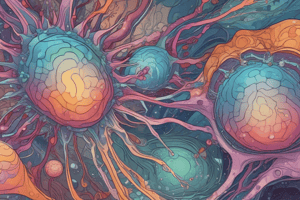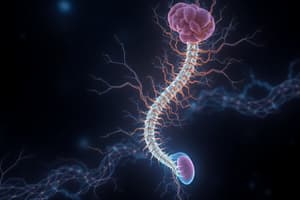Podcast
Questions and Answers
During sensitive periods, the majority of experiential effects on development occur
During sensitive periods, the majority of experiential effects on development occur
- At any time
- Only during specific times (correct)
- Only during critical times
- At random times
Which of the following is a consequence of deprivation in early studies on experience and neurodevelopment?
Which of the following is a consequence of deprivation in early studies on experience and neurodevelopment?
- Increased dendritic spines
- Thicker cortex
- Deficits in depth perception (correct)
- Increased synapses
What is the effect of enriched environments on neurodevelopment?
What is the effect of enriched environments on neurodevelopment?
- Fewer synapses
- Deficits in pattern perception
- Fewer dendritic spines
- Thicker cortex (correct)
What is the consequence of early monocular deprivation?
What is the consequence of early monocular deprivation?
Where does neurogenesis occur in adult mammals?
Where does neurogenesis occur in adult mammals?
What is the function of new cells generated through neurogenesis in the adult hippocampus?
What is the function of new cells generated through neurogenesis in the adult hippocampus?
What is the prevalence of Autism Spectrum Disorder (ASD) according to the CDC?
What is the prevalence of Autism Spectrum Disorder (ASD) according to the CDC?
Which of the following is NOT a stage of neurodevelopment?
Which of the following is NOT a stage of neurodevelopment?
What is the main function of the mesoderm layer in neurodevelopment?
What is the main function of the mesoderm layer in neurodevelopment?
What is the criteria for a cell to be classified as a stem cell?
What is the criteria for a cell to be classified as a stem cell?
What is the term used to describe the process by which a stem cell culture becomes self-renewing?
What is the term used to describe the process by which a stem cell culture becomes self-renewing?
During which weeks of development does the neural plate develop into the neural tube?
During which weeks of development does the neural plate develop into the neural tube?
During neural proliferation, cell division in the neural tube primarily occurs in which region?
During neural proliferation, cell division in the neural tube primarily occurs in which region?
What is the term used to describe the cells of the neural plate?
What is the term used to describe the cells of the neural plate?
Which type of migration occurs at a right angle to radial migration and parallel to the neural tube walls?
Which type of migration occurs at a right angle to radial migration and parallel to the neural tube walls?
What is the main difference between totipotent, pluripotent, and multipotent cells?
What is the main difference between totipotent, pluripotent, and multipotent cells?
What are the stem cells in the developing nervous system called?
What are the stem cells in the developing nervous system called?
Which method of migration involves the extension of a developing cell in the direction of migration, followed by the movement of the cell body along the extending process?
Which method of migration involves the extension of a developing cell in the direction of migration, followed by the movement of the cell body along the extending process?
What is the process called when developing neurons align themselves with other migrating cells in the same region?
What is the process called when developing neurons align themselves with other migrating cells in the same region?
Which molecules, located on the surface of cells, mediate migration and aggregation by recognizing molecules on other cells and adhering to them?
Which molecules, located on the surface of cells, mediate migration and aggregation by recognizing molecules on other cells and adhering to them?
Which process involves the focusing of synaptic contacts on a smaller number of cells, resulting in the selectivity of synaptic transmission?
Which process involves the focusing of synaptic contacts on a smaller number of cells, resulting in the selectivity of synaptic transmission?
Which area of the brain in individuals with Williams syndrome is observed to have reduced cortical volume?
Which area of the brain in individuals with Williams syndrome is observed to have reduced cortical volume?
What is the role of glial activity in the development of ASD?
What is the role of glial activity in the development of ASD?
What is a characteristic difference between individuals with Williams syndrome and those with ASD?
What is a characteristic difference between individuals with Williams syndrome and those with ASD?
Which area of the brain is typically unaffected in individuals with Williams syndrome?
Which area of the brain is typically unaffected in individuals with Williams syndrome?
What is the main focus of research on neural mechanisms in individuals with ASD?
What is the main focus of research on neural mechanisms in individuals with ASD?
What is the underlying cause of the health issues observed in individuals with Williams syndrome?
What is the underlying cause of the health issues observed in individuals with Williams syndrome?
What is a characteristic physical feature of individuals with Williams syndrome?
What is a characteristic physical feature of individuals with Williams syndrome?
What is the main difference between the symptoms displayed by individuals with ASD and Williams syndrome?
What is the main difference between the symptoms displayed by individuals with ASD and Williams syndrome?
What is the role of the fusiform face area in individuals with ASD?
What is the role of the fusiform face area in individuals with ASD?
Flashcards are hidden until you start studying
Study Notes
Development and Neuroplasticity
- Most experiential effects on development occur during sensitive periods.
- Early deprivation studies show consequences such as delayed cognitive and emotional development.
Effects of Enriched Environments
- Enriched environments enhance neurodevelopment by promoting neurogenesis and synaptic plasticity.
Early Monocular Deprivation Consequences
- Leads to permanent deficits in visual processing and depth perception, as the brain becomes less adaptable.
Neurogenesis in Adult Mammals
- Occurs primarily in the hippocampus, an area crucial for memory and learning.
Function of New Cells in Adult Hippocampus
- New neurons contribute to memory formation and may aid in mood regulation.
Prevalence of Autism Spectrum Disorder (ASD)
- According to the CDC, approximately 1 in 54 children are diagnosed with ASD.
Stages of Neurodevelopment
- Not all processes of development are classified into established stages; for example, "neural programming" is not a recognized stage.
Mesoderm Layer Function
- The mesoderm layer plays a critical role in forming connective tissues, including muscles and the skeletal system, impacting neurodevelopment.
Criteria for Stem Cell Classification
- To qualify as stem cells, cells must demonstrate the ability to self-renew and differentiate into various cell types.
Self-Renewing Stem Cell Cultures
- The term for a stem cell culture becoming self-renewing is “clonal expansion.”
Development of Neural Plate into Neural Tube
- The neural plate develops into the neural tube during weeks 3 to 4 of embryonic development.
Neural Proliferation Location
- Cell division during neural proliferation occurs mainly in the ventricular zone of the neural tube.
Cells of the Neural Plate
- The cells in the neural plate are referred to as neuroectodermal cells.
Migration Types
- Tangential migration occurs parallel to the neural tube walls, while radial migration moves perpendicularly.
Differences in Stem Cells
- Totipotent cells can differentiate into any cell type including extra-embryonic tissues, pluripotent cells can form any body tissue but not extras, while multipotent cells are limited to a specific lineage.
Stem Cells in Developing Nervous System
- In the developing nervous system, the stem cells are known as neural stem cells.
Method of Migration in Developing Cells
- The method involving extension of the cell in the direction of migration is called "amoeboid migration."
Neuronal Alignment Process
- The process where developing neurons align with other migrating cells is termed "radial glial guidance."
Molecules Mediating Migration
- Cell adhesion molecules on cell surfaces facilitate migration and aggregation by recognizing and adhering to similar molecules on neighboring cells.
Synaptic Contact Focusing
- The process focusing synaptic contacts on fewer cells is known as "synaptic pruning."
Williams Syndrome and Cortical Volume
- Individuals with Williams syndrome show reduced cortical volume in the occipital lobe.
Role of Glial Activity in ASD
- Glial activity may contribute to abnormal neural development seen in individuals with ASD.
Differences Between Williams Syndrome and ASD
- A key distinction is that individuals with Williams syndrome often exhibit sociability, while those with ASD may struggle with social interactions.
Unaffected Brain Area in Williams Syndrome
- The cerebellum tends to remain unaffected in individuals with Williams syndrome.
Research Focus on ASD
- Main research investigates the neural mechanisms underlying the social deficits associated with ASD.
Health Issues in Williams Syndrome
- Health issues stem from genetic conditions affecting connective tissues and cardiovascular systems.
Physical Features of Williams Syndrome
- A characteristic feature includes distinct facial profiles with wide mouths.
Symptom Differences Between ASD and Williams Syndrome
- Individuals with ASD may display repetitive behaviors, which differ significantly from the sociability seen in Williams syndrome.
Role of Fusiform Face Area in ASD
- The fusiform face area is involved in facial recognition and may be less active in individuals with ASD.
Studying That Suits You
Use AI to generate personalized quizzes and flashcards to suit your learning preferences.




